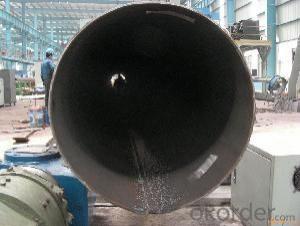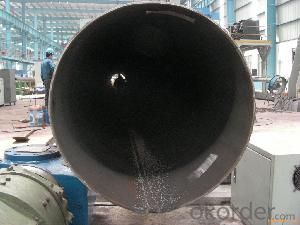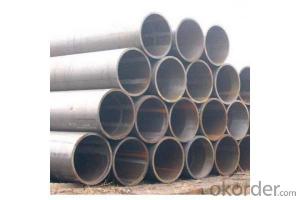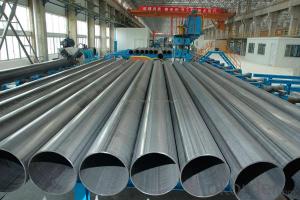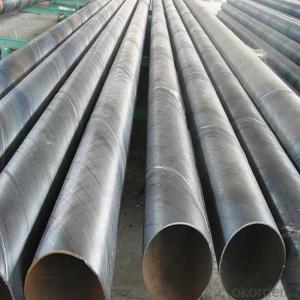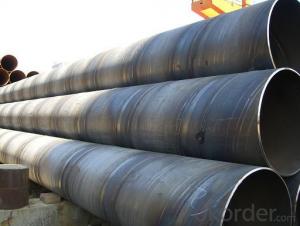LSAW SSAW CARBON STEEL PIPE ASTM API 12’‘ 14’‘ 16’‘ 18’‘
- Loading Port:
- Tianjin
- Payment Terms:
- TT OR LC
- Min Order Qty:
- 1 m.t.
- Supply Capability:
- 3000 m.t./month
OKorder Service Pledge
OKorder Financial Service
You Might Also Like
Packaging & Delivery
Packaging Detail: | Normal exporting packing,in container or bulk vessel or as per clients' request |
Delivery Detail: | 2 months after confimed contract |
Specifications
Large Diameter API 5L X70 PSL2 LSAW Steel Pipe
Grade: X42, X46, X50, X52, X60, B, C
OD: 1.5"-28"
WT: SCH10-SCH160
Large Diameter API 5L X70 PSL2 LSAW Steel Pipe
Specifications:
u Standard: API 5L
u Grade: B, C, X42, X46, X50, X52, X56, X60, X65, X70, X80
u OD: 1.5"-28"
u WT: SCH10-SCH160
u Length: 5-12m
u Ends Finish: plain end, bevel end, grooved end
u Surface Treatment: bare, black varnished, oiled finish, red color, anti-corrosion, 3PE, FBE or epoxy coating
u Technique: hot rolled or cold drawn
u Application: api 5l steel pipe for conveying oil, water, gas
u Invoicing: based on theoretical weight or actual weight
u Payment Terms: L/C at sight, T/T or Western Union
u Trade Terms: FOB, CFR, CIF
u Certification: ABS manufacturing assessment, ABS design assessment, API 5CT, API 5L, DNV manufacturer certificate, ISO9001 quality management system certificate, ISO14001 environment management system certificate, GB/T28001 occupational health and safety management system certificate, A1 class manufacturing license of special equipment certificate, CCS, GL, LR, SGS, TüV, PDE
- Q: What is the average lifespan of a steel pipe?
- The average lifespan of a steel pipe can vary depending on various factors such as its quality, usage conditions, maintenance, and exposure to external factors. However, on average, a properly installed and maintained steel pipe can last anywhere from 20 to 100 years or more.
- Q: How are steel pipes used in the manufacturing of heat exchangers?
- Steel pipes are commonly used in the manufacturing of heat exchangers due to their strength, durability, and ability to withstand high temperatures and pressures. These pipes are typically used to create the primary heat transfer surfaces within the heat exchanger, allowing for efficient transfer of heat between two fluids. The steel pipes are often arranged in a coil or tube bundle configuration, providing a large surface area for heat exchange to occur. Additionally, the corrosion-resistant properties of steel make it an ideal choice for handling various fluids in heat exchanger applications.
- Q: 304 stainless steel tube with the diameter of 25*2-3 is what mean
- This is according to the "water drawing standards" (GBT50106-2001) in 2.4.2-2 seamless steel pipe, welded steel pipe (straight or spiral seam), brass, stainless steel pipe, pipe diameter should be D diameter * thickness representation (such as D108 * 4 and D159 * 4.5); and the provisions of the habit of acting D with seamless pipe diameter.
- Q: Can steel pipes be used for sewage disposal systems?
- Yes, steel pipes can be used for sewage disposal systems. Steel pipes are commonly used for underground sewage lines due to their durability and resistance to corrosion. They can efficiently transport sewage from residential, commercial, or industrial areas to sewage treatment plants or disposal sites.
- Q: Are steel pipes suitable for underground sewage systems?
- Yes, steel pipes are suitable for underground sewage systems. They are durable, strong, and resistant to corrosion, making them a reliable choice for carrying sewage underground. Additionally, steel pipes have a long lifespan and can withstand the pressure and weight of the surrounding soil, making them a suitable option for underground sewage systems.
- Q: Where is the difference between seamless steel pipe and welded pipe?
- The steel tube is a hollow steel strip, used as pipe conveying fluid, such as oil, gas, water, gas, steam, in addition, the bending and torsional strength of the same, the weight is light, so it is widely used in the manufacture of machinery parts and engineering structures. It is also used to produce all kinds of conventional weapons, guns, shells and so on.
- Q: How are steel pipes protected against fire?
- Steel pipes are protected against fire through various methods such as applying intumescent coatings, using fire-resistant insulation, or encasing them in fire-rated enclosures. These measures help to delay the heat transfer and maintain the structural integrity of the pipes during a fire, allowing them to withstand high temperatures and prevent the spread of fire.
- Q: How are steel pipes used in construction?
- Steel pipes are commonly used in construction for various purposes such as structural supports, plumbing systems, and underground utility installations. They provide strength, durability, and flexibility, making them suitable for carrying fluids, gases, and structural loads. Steel pipes are often used in the construction of buildings, bridges, and infrastructure projects, ensuring reliable and long-lasting performance.
- Q: What is the fire rating of steel pipes?
- The fire rating of steel pipes depends on several factors. Steel is inherently fire-resistant due to its high melting point and low thermal conductivity. However, the fire rating of steel pipes can be further enhanced through the use of fire-resistant coatings or insulation materials. These additional measures can provide varying degrees of fire protection, typically measured in terms of the duration the pipes can maintain their structural integrity in a fire scenario. The specific fire rating of steel pipes can vary depending on the thickness and type of coating or insulation used. It is important to consult industry standards, such as those set by organizations like the National Fire Protection Association (NFPA), or consult with fire safety professionals to determine the appropriate fire rating requirements for specific applications.
- Q: What are the applications of stainless steel pipes?
- Stainless steel pipes are widely used in various industries and applications due to their excellent corrosion resistance, durability, and strength. Some common applications include plumbing systems, water supply and distribution, heating and cooling systems, oil and gas industry, chemical processing plants, food and beverage industry, automotive industry, construction, and infrastructure projects. Additionally, stainless steel pipes are also utilized in pharmaceutical manufacturing, aerospace engineering, marine applications, and wastewater treatment facilities.
Send your message to us
LSAW SSAW CARBON STEEL PIPE ASTM API 12’‘ 14’‘ 16’‘ 18’‘
- Loading Port:
- Tianjin
- Payment Terms:
- TT OR LC
- Min Order Qty:
- 1 m.t.
- Supply Capability:
- 3000 m.t./month
OKorder Service Pledge
OKorder Financial Service
Similar products
Hot products
Hot Searches
Related keywords
